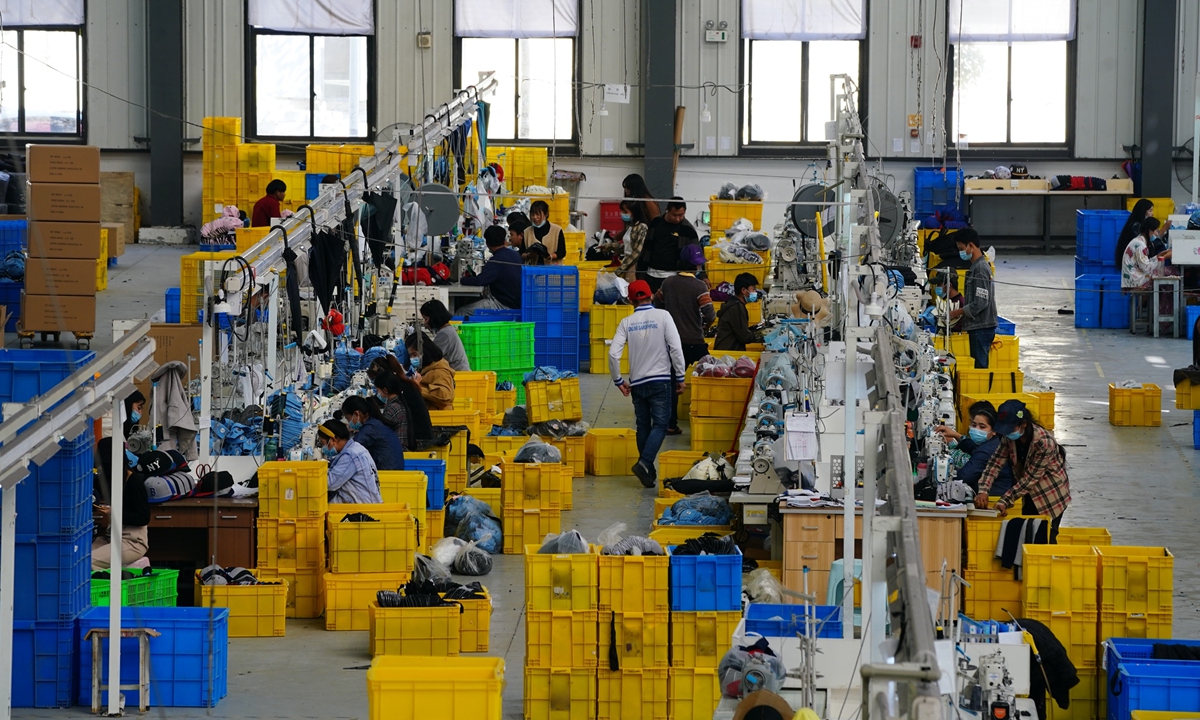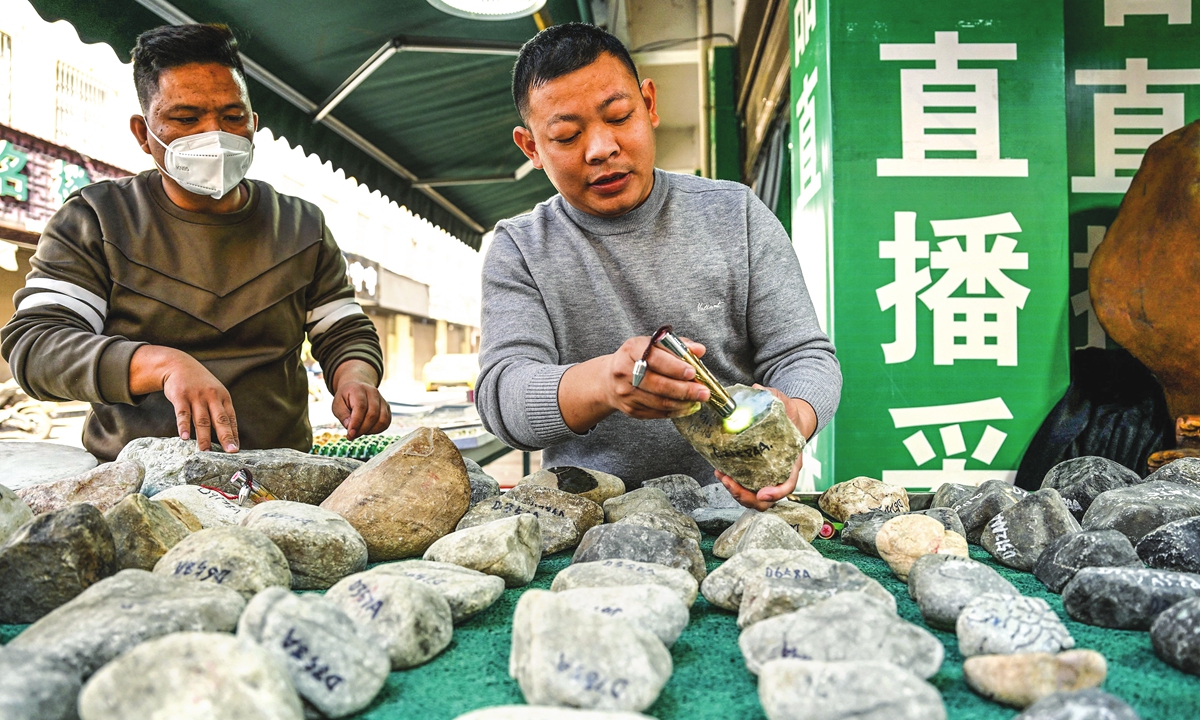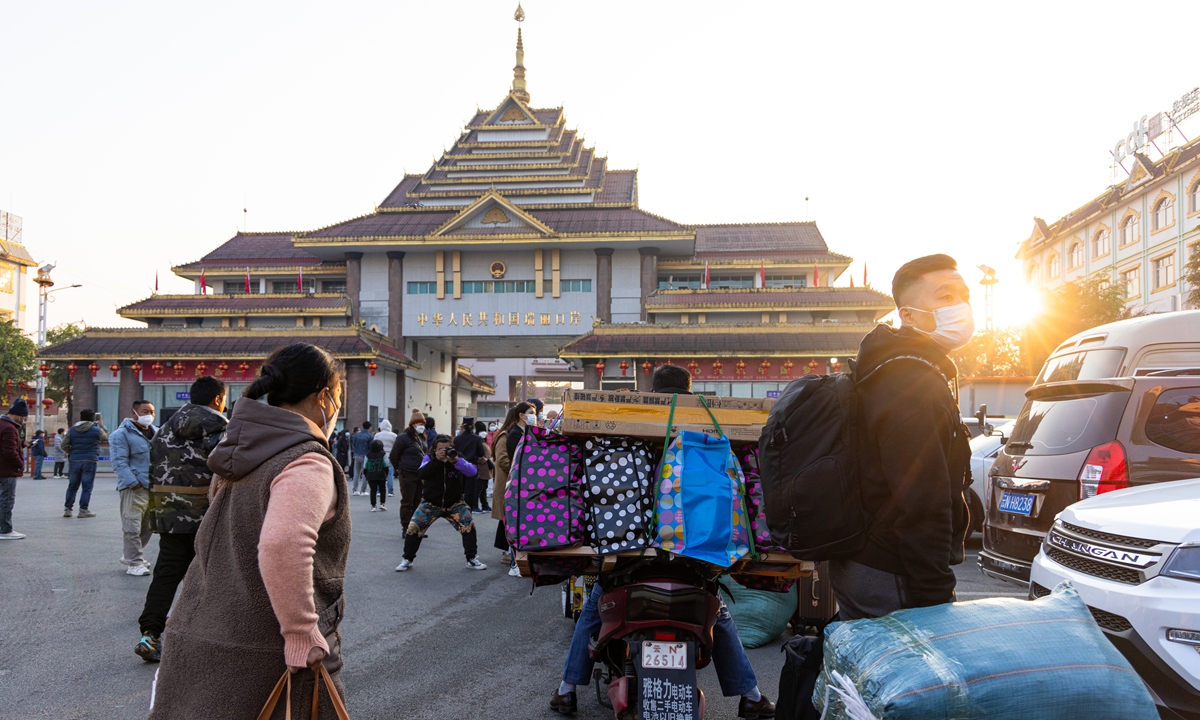
Workers from China and Myanmar work in a factory at the Ruili industrial park, which has maintained production in the past three years. Photo: Fan Wei/GT
As border cities are reactivated after reopening, so too have cross-border migrant workers been reenergized.
The Muse-Ruili checkpoint - a China-Myanmar border crossing crucial to trade, and that is also among the busiest in South Asia - partially reopened recently, after an almost three-year COVID-19-prompted closure since late March 2020.
Pre-epidemic hustle and bustle has gradually been returning to the border city of Ruili, Southwest China's Yunnan Province, as more cross-border migrant workers from Myanmar have made their much-anticipated return to China as the country downgraded its COVID-19 management. There was palpable excitement leading up to the reopening of the borders, as people on both sides peered through barbed wire to the opposite side. In cities where migratory flow had slowed to a trickle over the last three years, a steady stream of migratory flow is now being witnessed, further boosting local economies.
A similar situation is being witnessed in the Chinese border city of Hekou, 1,000 kilometers away, also in Yunnan, connecting China and Vietnam. Much like Ruili, Hekou port saw an influx of inbound migrant workers and businesspeople from Vietnam on the very first day of its reopening on January 8.
Volunteers could hardly contain their happiness by cheering and clapping at the Hekou port as the first batch of migrant workers arrived at the entrance, welcoming them in both Chinese and Vietnamese.
Some workers were accompanied by their children and their belongings in tow, while others rushed to the port checkpoint to renew their credentials, in a moment filled with joy and hope.
Over the last three years, border closures and suspended trade have affected migrant workers' ability to earn a living and drastically reduced border crossings, causing great uncertainty and frustration.
But the pandemic did not break the migrant workers' ties with China, nor did it deter their desire to return to China.
In contrast with those returning, some cross-border workers were determined not to leave China during the pandemic, and were in China as the country waged a brave fight against the COVID-19 epidemic, volunteering their services during lockdowns at different times.
The returning cross-border workers are expected to make crucial contributions to the economic recovery of border towns while also seeing personal benefits in their own lives, the Global Times learned.

A man shows a raw jade stone at a shop in Ruili, Yunnan Province, on January 13, 2023. Photo: VCG
Stick with solid attractionZin Myo Thu, a popular livestreamer in the jade industry from Myanmar, is one of those who remained in Ruili, after not heeding his mother's calls to return to Myanmar during frequent COVID-19 lockdowns in Ruili.
Though he looks unmistakably from Myanmar, he speaks fluent Chinese without the hint of a foreign accent.
He was one of the livestreaming pioneers in jewelry and jade sales in Ruili, and also the first foreign livestreamer in the local jade market. During his two years as a livestreamer, his broadcast has generally attracted an average of over 100,000 live views with a turnover of up to 70 percent.
According to media reports in November 2020, the number of Myanmar nationals doing business and working in Ruili year-round reached 100,000 at its peak. Myanmar nationals constitute the largest flow of cross-border human traffic at the Ruili port. In the first half of 2019, according to the official data from the Ruili government, 91.35 percent of the inbound and outbound crossings at the Ruili port were Myanmar nationals. A large number of them are engaged in businesses related to jewelry and jade .
Most of these people went back to Myanmar as jade trade fairs became dull due to the suspension of imports of jade from Myanmar.
But some chose to stay in China, out of a personal affinity with the country after having adapted to life here, along with an enduring hope for a rapid reset to the situation caused by the pandemic.
Zin Myo Thu, 33, regards Ruili as his second hometown as he has spent over half of his life in China. Now he has a family in Ruili.
He took the Global Times reporters to visit multiple ethnic villages and alleyways on his motorcycle. He is a veteran local tour guide who has tried to recreate a pre-pandemic atmosphere.
He said that Ruili gives him the privilege to earn a competitive salary, which is the envy of many of his fellow compatriots from Myanmar. It also enabled him to be a mentor encouraging and enticing many of his fellow compatriots from Myanmar to come to China for better opportunities.

The Ruili port is reopened on January 8, 2023. Photo: VCG
"China's"China's rapid development is clearly becoming more attractive to young people in Myanmar. There are more jobs and better pay in Ruili than in some cities of Myanmar; and for many among the youth, Ruili is easier to adapt to because there are so many of their compatriots here," Zin Myo Thu told the Global Times.
Since the end of May 2020, the Chinese government has provided Myanmar nationals working in China with an all-in-one card - Paukphaw Card - which allows them to do free nucleic acid tests, visit scenic spots, and rent houses.
Holders of the Paukphaw Card primarily work in the processing and services industries in Ruili, or run jade shops and are involved in wholesale trade. Many of them have settled down in the city.
Today, Ruili is open to visitors from all over the world. Zin Myo Thu said that Ruili has seen an obvious uptick in traffic after the downgrading of epidemic control measures, and he believes the reopening will bring about an explosive boom in the jade market.
In the Ruili industrial park, a large number of cross-border workers from Myanmar who remained in China over the last three years maintained normal operations and services.
The Global Times noted that employees from Myanmar in the park are provided with a complete suite of amenities including modern dormitories, a bank, and medical facilities all within the park.
Popular Myanmar background music is usually heard playing in some workshops.
Wang Baoxiang, a staffer from Myanmar who works in Ruili, told the Global Times that he is very satisfied with all aspects of working in Ruili, and he now earns at least 3,000 yuan ($442.9) per month more than his peers at home.
To "thank" Myanmarese employees who stayed behind to work during the pandemic, many enterprises in the park have introduced subsidies or further increased their wages, making them even more competitive than the pre-pandemic period in 2019. Many young people from Myanmar are now eager to work in China precisely because of the greater benefits to be had.
Li Zhaoxia, an executive at an electronics component manufacturer located in the import and export processing and manufacturing base in Ruili's industrial park, told the Global Times that after posting a job vacancy, employees from Myanmar at her factory would spread the words among friends and family back home, and nearly 600 people signed up overnight.
"The salary here; the factory environment; the friendly treatment of workers… I should say all aspects here are attractive to our friends in Myanmar," she said.
Return with strong confidenceFor those cross-border workers who temporarily left, their return was one yearned for and three years overdue. They look forward to a rebound in economy and a booming labor market in the reopened cities.
Nguyen Thuy Anh, 32, from Vietnam, graduated from a university in Vietnam after majoring in Putonghua and Chinese education. She is the HR director of the Huike Corporation (HKC) located in the China (Hekou)-Vietnam (Lao Cai) Cross-border Economic Cooperation Zone. She is in charge of recruitment and language and cultural training of Vietnamese employees, after she resigned from a school in the bordering city of Lao Cai, Vietnam, in 2017.
She is considering a return to Hekou after the Lunar New Year holidays.
She told the Global Times, via video link, that many Vietnamese workers she knows are constantly asking about the border reopening and whether businesses are rehiring.
"For many young Vietnamese people who are close to the border, Hekou is an ideal destination to work, with stable wages and proximity. Cooperative projects between the two countries also provide a lot of secure opportunities," said Nguyen Thuy Anh.
In 2017, the local Hekou government set up a management and services center for foreign workers, which provides convenient "one-stop" services including medical examinations, residence permit processing and issuance, employment registration certification, and vocational training and translation, to further protect the legitimate rights and interests of foreign workers.
"In some Vietnamese villages near the border, a family's monthly income of 150 yuan can meet the local poverty threshold. While, cross-border labors working in Hekou can earn 2,000 to 3,000 yuan a month for their families, a great driver for impoverished families," she said.
"I am proud to help more Vietnamese workers to come to Hekou in search of stable incomes. I have had villagers bring eggs and poultry to thank me for finding a reliable way for them to earn a living. The opportunity to learn skills and Chinese also opens up employment channels for them," she told the Global Times.
Nguyen Thuy Anh says it takes her only about 30 minutes to get to work across the border from her home in Lao Cai, a much shorter commute than many young people in China's first-tier cities.
She looks forward to cross-border trains or buses between Hekou and Lao Cai. She believes that better transport will spur a new wave of cross-border mobility.






